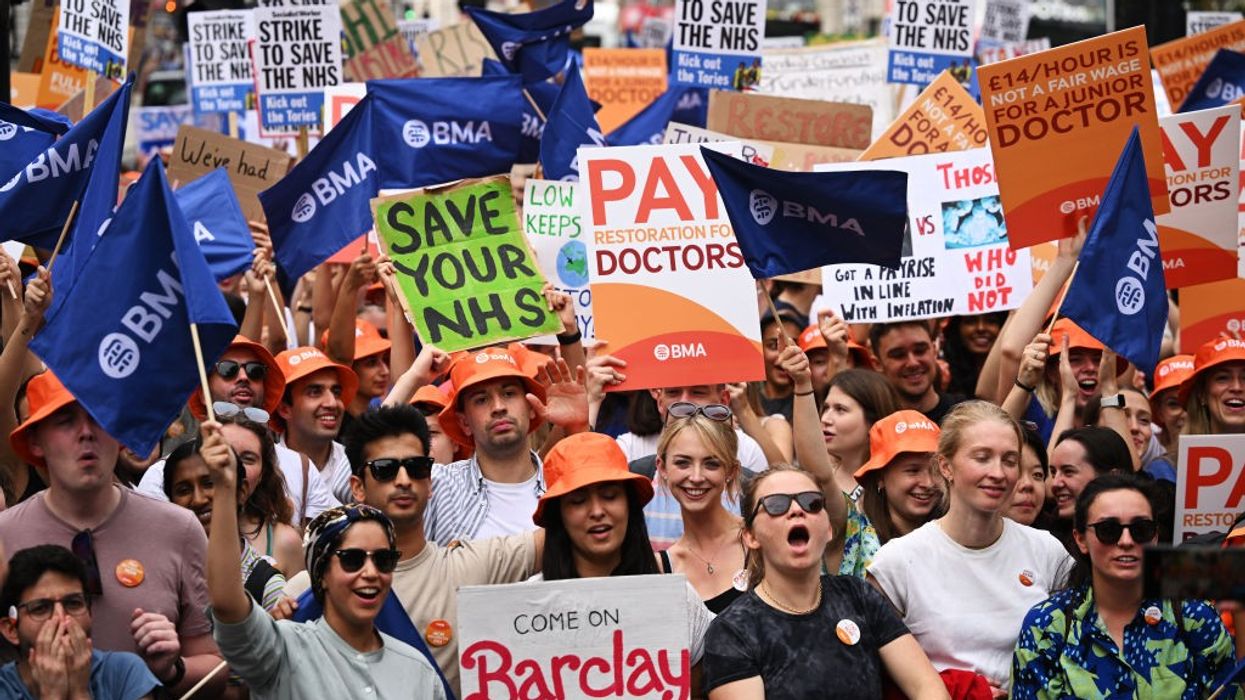Atul Patel and Pritee Panchmatia are calling for urgent reforms—including mandatory 28-day prescriptions and a two-pharmacist model to reduce unnecessary medicines waste.
Pharmacists have expressed concerns about the growing problem of medicines waste, citing over-prescribing and the high volume of uncollected and unused prescriptions as key contributing factors.
According to a 2024 Department of Health report, unused medicines cost the NHS approximately £300 million every year —comprising an estimated £110 million worth of medicine returned to pharmacies, £90 million worth of unused prescriptions being stored in homes and £50 million worth of medicines disposed of by Care Homes.
“Medicines waste is often caused by overprescribing and not actually knowing whether patients are taking the medication,” said Atul Patel, superintendent pharmacist at Lincoln Pharmacy.
He highlighted the issue of patients being given three-month supplies of medications like Ramipril, leading to unnecessary waste if blood tests reveal problems and require switching medication.
“When patients are initiated on therapy for blood pressure, you’re supposed to have blood tests done in two weeks. But I had a case where a patient was started on Ramipril and given a three-month supply. Why?
“If I do the blood tests in two weeks and the results do not come out right, I have to stop the medication and switch it. That leaves two months’ worth of medication wasted.”
To avoid this unnecessary waste, Patel advocated for mandatory 28-day prescriptions.
“If the medication needs to be changed after three weeks when the blood results come, you’re not going to lose that much of waste,” he explained.
He also pointed out the issue of unused medication, noting that many patients don’t actually take what’s prescribed.
“You have to look at pharmacy waste bins to see how much medication is returned unused. Patients will often tell the doctor, ‘Yes, I’m taking it,’ but it’s the pharmacists who know the reality.”
Right now, most of the unused medicines are likely incinerated without proper auditing. To get accurate data, this kind of waste should be systematically reviewed and studied, Patel suggested.
Patel believes that a two-pharmacist model—one pharmacist to handle routine services, and another, a highly trained independent prescriber, to carry out early interventions could help cut down medicine waste significantly.

“If the entire medication process—including repeat prescriptions, initiation, and clinical reviews—were managed at the pharmacy level, it would significantly reduce waste and make the patient’s journey to accessing medicines and healthcare professionals much easier.”
“That’s why I believe the government should invest in a two-pharmacist model.”
“One pharmacist continues providing routine services, while a highly trained independent prescriber—like myself—runs clinics. We can make early interventions with controlled wastage. It’s a win-win for both patients and the NHS.”
He noted that the government currently supports pharmacists at health centres but not at pharmacies, and that pharmacies are still dependent on GP referrals.
“There is no model in place at the moment that the government is looking at, and most of the support goes to having pharmacists and staff at the health centre level, but rarely at the community pharmacy,” Patel noted.
“In 2025, pharmacists will come out as independent prescribers, and the Pathfinder programme is being used to support this. However, even that isn’t properly remunerated to ensure effective evaluation.”
“We’re still in a situation, much like with the Pharmacy First programme, where we depend on referrals from GPs. We’re working with our hands tied behind our backs—and that needs to change, drastically.”
“The two-pharmacist model is something the government should invest in without hesitation. They will see results immediately.”
He also emphasised the need for investment in technology and apprentices to improve patient care and reduce medication waste.
“We need investment in technology to free up our time so that we can focus on the most important task: addressing and treating the patient.”
Uncollected medication
Uncollected medication is a significant but often overlooked issue in the pharmacy system.
“Not only does it waste the pharmacy’s time and resources in obtaining and preparing prescriptions, but also represents a huge cost to the NHS,” Pritee Panchmatia, superintendent pharmacist and director of Howletts Pharmacy told Pharmacy Business.
She explained: "Every month, we put back into stock items not collected from the month before. For instance, as we come to the end of May, we’ll remove from the shelf everything that wasn’t collected in April, otherwise, it’s just going to sit there.”
“It’s potentially wasted time and money obtaining the stock, especially if it’s something we don’t normally keep in stock and have ordered specifically for that prescription.”
“As a business, we often lose money procuring stock that we can’t use because the patient never collected it, and we’re not allowed to claim for it since it was never handed out to the patient.”
“Also, people often forget the time we spend preparing these prescriptions. I’ve paid for my staff to dispense it, label it, and keep it ready. That time goes to waste, and then additional time is spent returning it to stock, hoping we can reuse it for someone else.”
“This issue needs to be addressed,” she added.
Panchmatia also pointed out that two- or three-monthly prescribing is not the right approach, as it increases the volume of waste.
“Prescribers don’t always see the level of wastage that comes back to pharmacies. And it’s not just about the medication that sits on the shelf — we also see medication that has been dispensed, but not used by the patient, and then returned to us for disposal.”
“That’s a huge cost to the NHS because that is money we've claimed for. That’s money the government has paid to the prescriber and dispenser — and now that medication is going into the bin because we can’t reuse it. It all gets incinerated.”
So, according to her, there are two issues that need attention:
- The time and money spent on medication that sits on shelves and is never collected, and
- The medication that is collected by patients but not used and ends up being destroyed.
Reasons for uncollected medication
There are various reasons patients might decide not to collect their prescriptions.
Panchmatia elaborated: “A lot of the time, it might be something prescribed for an acute illness. You often see antibiotics or other medications not collected, especially when they're for conditions that aren’t long-term.”
“Patients sometimes decide they no longer want the medication. Other times, patients come in for two or three but opt to leave one behind to avoid paying multiple prescription charges.
“When it's long-term, regular medication, we do try to contact the patient before returning it to stock. But even then, we don’t always hear back.”
“Sometimes, we never find out the reason—it’s simply never collected, and the patient doesn’t explain why.”
“I’ve also noticed, especially when we used to do Medicines Use Reviews (MURs), that patients sometimes pretend to their GP they’re taking something regularly when they’re not, because they don’t want the GP to stop prescribing it or think they’re non-compliant.”
“So, they either never collect it from us, or they do, and a year or two later, return a huge pile of unused medication for disposal.
“In reality, they don't always collect it from us, or they collect it, but then a year or two later, return a huge pile of unused medication for disposal.”
Need greater patient awareness, system reforms
Wales and Scotland have introduced free prescriptions for everyone, but Panchmatia feels that when medication is free, patients don’t always value what they’re getting.
“I find that those who pay are more likely to, if they need their medication, to take it regularly and not waste it because they've paid for it.”
“I’m not suggesting we start charging every patient for every medication. But perhaps we need more education around what these medications actually cost.”
“We often talk about how much hospital visits or GP appointments cost, but rarely do we talk about the cost of unused medication.”

Panchmatia emphasised the need for putting better systems in place to avoid medicine wastage.
“If a patient knows a prescription is being sent but they’re unlikely to need it or collect it, there should be a mechanism where they tell the pharmacy, 'Don’t dispense it unless I confirm.'”
“Take antibiotics, for instance—a GP might say, 'We’re prescribing it, but don’t take it unless your symptoms don't improve.' But that message doesn’t reach us, so we dispense it straight away, and it sits on the shelf to be collected.”
Panchmatia also emphasised the need to raise patient awareness about the true cost of medication and the importance of collecting their prescriptions on time.
"One thing that stood out when we took part in the NPA campaigns is that many patients don’t realise that in a pharmacy, medication is purchased at the cost of the business.”
“People are often unbothered when they think it’s NHS money, but when they realise it impacts the pharmacy—because we buy the medication and don’t get reimbursed until it's dispensed—they tend to start thinking a little differently."
NHS encourages patients to let their GP or pharmacist know if they have difficulty taking their medicines or if they have stopped taking any medicines.












